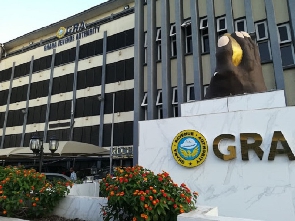The Commissioner of Domestic Tax at the Ghana Revenue Authority (GRA), Edward Apenteng Gyamerah, has announced that the authority is set to begin phase-one of onboarding 600 businesses onto its electronic value added tax (e-VAT) system after engaging taxpayers.
Speaking on the sidelines of an engagement with key Chief Executive Officers in Accra, Mr. Gyamerah explained that this will be followed by the issuance of letters to business entities stating the date they will officially be put on the new system. After this, each entity will be assigned a relationship manager who will serve as a liaison between the company and GRA’s technical team.
This will follow a two-week engagement with taxpayers starting this week.
The e-VAT is an electronic means of issuing VAT receipts or an electronic invoicing system for VAT-registered businesses. The e-VAT system being introduced is not a new tax, but an improvement on how VAT transactions are invoiced.
This system applies to both the VAT Flat Rate and Standard Rate Schemes. By this, all VAT components for both VAT types still hold in the calculation of liabilities.
In 2021, a total tax revenue of GH¢57.4billion was collected for the period as against the targetted GH¢57.1 billion, representing an excess of GH¢377.81million or 0.7 percent. The performance represents a nominal growth rate of 26.3 percent over same period 2020.
However, VAT contribution to the total tax collection has consistently declined over the years since 2017 – from 24.88 percent to 19.3 percent in 2021, averaging about 20.73 percent over the period.
Indirect domestic revenue collected in 2021 was about GH¢13.75million as against the target of GH¢13.95 million, an excess of GH¢202.32million, representing 1.5 percent shortfall of the target. VAT accounted for 19.3 percent
Focusing on the contributions of VAT in the country’s development, the Commissioner made comparison with neighbouring countries that are reaping the benefits of VAT; with Togo getting 40 percent while Benin and Burkina Faso receive 42 percent and around 50 percent respectively.
All interventions by the authority to improve on the contributions of VAT to the country’s development have yielded no result; hence the need for implementing the e-VAT which has the propensity of improving revenue.
Until this is achieved, Mr. Gyamerah said, targets for key economic indicators such as interest rate and exchange rate levels will not be met.
“Until we are able to improve on our revenue to get an appreciable tax-to-GDP ratio, most indicators that businesses need to improve will not be at the level they want; because when revenue targets are not met, it leads to distress which can affect a number of indicators such as exchange and interest rate among others,” he said.
The engagement with CEOs is aimed at educating them on the legal framework and operations of the invoicing system, as well as addressing their concerns about the e-VAT system to ensure a smooth implementation of the policy.
Commenting on the pilot phase’s outcome, he described it as extremely successful and urged taxpayers to support the authority during the onboarding process to raise needed revenue for the country’s development.
Addressing questions from taxpayers on the issue of security with regard to their business information, he made reference to the law that prohibits any tax officer from disclosing taxpayer’s information and assured them of keeping their database safe and secret.
“Taxpayer information has always been kept secret by officers of GRA. We have provisions in the tax laws that prevent any officer of GRA disclosing a taxpayer’s information to a third party. Information can be disclosed only when it is by order of a court or requested for the purposes of revenue administration; otherwise, no officer has the right to disclose any information. As we begin implementation of the e-VAT, we will still be guided by the same provisions of keeping the taxpayer’s information secret.”
Touching on the legal framework, Isaac Sarfo, Technical Director with GRA, mentioned that amendments of the VAT Act made provisions to abridge the time-frame in which a recipient who is a taxable person receives an invoice from 30 days to 48 hours.
He also noted that the earlier amendments of last October which made provisions for transitional matters were followed up with a new one. While the old amendment gave taxpayers the right to connect to GRA’s system in one year, the new one does not make any provisions for a transitional period of onboarding; so any businesses scheduled for the process cannot cite the previous provisions as an excuse for not participating in the implementation process.
Speaking on the roll-out plan for the onboarding process, the Project Manager, Philip Acquah, said the piloting phase that onboarded 50 taxpayers has been completed, and they are currently looking at onboarding 600 taxpayers in the first phase by June 2023. Phase-two is expected to be completed in December 2023, and will onboard 1,000 businesses with the entire e-VAT implementation process ending in December 2024.
Business News of Monday, 3 April 2023
Source: thebftonline.com
GRA to commence phase-one of e-VAT system for 600 businesses
Opinions












